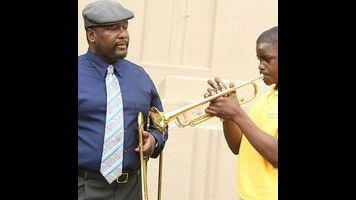Treme: "Santa Claus, Do You Ever Get The Blues?"

Hello everyone. Sorry to take last week off, but I had good reason. Thanks to Hayden Childs for filling in. He did a great job, of course, even if I liked the episode considerably more than he did. As unpleasant as it was—and the attack on LaDonna was certainly the most disturbing moment the series has produced so far—it also clearly established the stakes of the season and followed logically from what previous episodes had been setting up. Where the threat of crime had provided disturbing background noise in this season’s first two episodes, here it became an unavoidable din. It dovetails with what’s shaping up to be the season’s overarching theme: Who will decide the future of New Orleans? And it provides one possible answer to that question: Maybe New Orleans has no future beyond mayhem.
Set around Christmas, “Santa Claus, Do You Ever Get The Blues?” keeps running with that that notion. LaDonna doesn’t make her first appearance until after the 10-minute mark, but it’s a breathtakingly disturbing moment. Khandi Alexander—hats off to her fine work here, again—is almost unrecognizable, and not just because LaDonna sports a black eye in the scene. Hair untended and with little attention given to her clothing, she looks far removed from the strong, confident woman we’ve come to know. Beyond her appearance, Alexander’s body language tells the story of what happened last episode, and how shattered it’s left her. Later, in the episode’s penultimate scene, Antoine learns of the death of Dinerral Shavers, a real-life New Orleans drummer, educator, and member of the Hot 8 Brass Band who was killed by a senseless bit of street violence while driving with his family. The city has gone from unstable to openly perilous.
Crime’s not the only source for fear, however. Having reluctantly undertaken the role of assistant band director to some elementary school kids who don’t even have instruments yet, Antoine watches them flinch in terror as a storm presses in, stirring memories of Katrina. Empathy begins in moments like that, however reluctant Antoine might be to make room for it.
Other characters are trying to build something in the rubble. For Annie, that means playing with Shawn Colvin, wondering if the moment could bring her to the next level of her career, chatting with an agent who might make reaching that next level possible… and then watching the possibility vanish when he recognizes she’s not ready for it. Never all that confident—she did, after all, hitch her wagon to Sonny for a long stretch—Annie looks disappointed by surprisingly undefeated by the encounter, or at least cheery enough to offer up a gift-wrapped song to Davis for Christmas.
Davis, too, is trying to make something, trying to “take New Orelans music where it’s never gone before” via a label that mixes a variety of genres (while finding room for his own music, too). It’s a dream created by his own peculiar mix of self-confidence and self-loathing, believing that he can create something out of the music that he loves that will negate his background as an educated Uptowner. (The degree to which Davis hates being white and from money can’t be underestimated. Who else would blame Teach For America rather than the government that brought them there for the troubles facing New Orleans teachers after the storm?) It’s fast-tracked by Aunt Mimi’s money, which buys studio time, some contributions from bounce artists, and the production work of Don Bartholomew (a real-life New Orleans producer who’s one half, with his brother Ron, of the Bartholomew Boys and the son of Dave Bartholomew, the man responsible—as performer, songwriter, and producer—for a large chunk of classic New Orleans R&B). That may not be enough, but it’s a start.
Antoine, too, is in the mood to build, putting together a first-rate soul covers band from local musicians—including real-life Japanese-born, New Orleans-based guitarist June Yamagishi—putting it to the test in clubs, then losing a key component when Yamagishi pulls out. Enter Sonny, a serviceable at best guitarist who can’t remember when to show up with practice and celebrates a successful gig by scoring. Something’s got to change. It’s a small town, and as his bandmate reminds him, he’s “in no danger of being, like, no great musician.”
But building isn’t a purely positive activity. Nelson’s construction projects tear through the rubble throwing out the good with the bad, including furniture and books untouched by the storm. Like the education system that’s simply brought in Teach For America rather than try to fix its problems, his approach is one of indiscriminately sweeping away the old and sweeping in the new. Part of why I like this episode—and this show, really—is the way it makes such connections without putting too fine a point on them. Patterns repeat across the city as if this era of post-Katrina city life were willing them to happen. It’s a season of renewal, but sometimes renewal comes at a cost.

 Keep scrolling for more great stories.
Keep scrolling for more great stories.